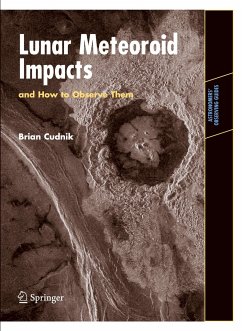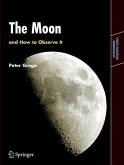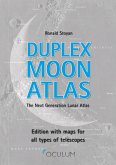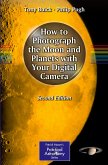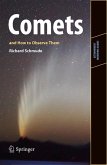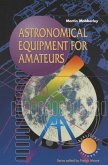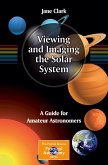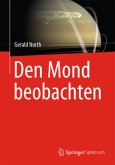Meteorites have had a major impact on the Moon's surface, and some scientists think they continue to. This book probes the effects and possible effects of meteorites on the Moon, and it guides amateur astronomers on how best to observe them.
The genesis of modern searches for observable meteoritic phenomena on the Moon is the paper by Lincoln La Paz in Popular Astronomy magazine in 1938. In it he argued that the absence of observed fashes of meteoritic impacts on the Moon might be interpreted to mean that these bodies are destroyed as luminous meteors in an extremely rarefed lunar atmosphere. The paper suggested the possibility of systematic searches for such possible lunar meteors. With these concepts in mind, I was surprised to note a transient moving bright speck on the Moon on July 10, 1941. It appeared to behave very much as a lunar meteor would - except that the poorly estimated duration would lead to a strongly hyperbolic heliocentric velocity. Thus, the idea of systematic searches for both p- sible lunar meteors and meteoritic impact fashes was born. It was appreciated that much time might need to be expended to achieve any positive results. Systematic searches were carried out by others and myself chiefy in the years 1945-1965 and became a regular program at the newly founded Association of Lunar and Planetary Observers, or ALPO.
The genesis of modern searches for observable meteoritic phenomena on the Moon is the paper by Lincoln La Paz in Popular Astronomy magazine in 1938. In it he argued that the absence of observed fashes of meteoritic impacts on the Moon might be interpreted to mean that these bodies are destroyed as luminous meteors in an extremely rarefed lunar atmosphere. The paper suggested the possibility of systematic searches for such possible lunar meteors. With these concepts in mind, I was surprised to note a transient moving bright speck on the Moon on July 10, 1941. It appeared to behave very much as a lunar meteor would - except that the poorly estimated duration would lead to a strongly hyperbolic heliocentric velocity. Thus, the idea of systematic searches for both p- sible lunar meteors and meteoritic impact fashes was born. It was appreciated that much time might need to be expended to achieve any positive results. Systematic searches were carried out by others and myself chiefy in the years 1945-1965 and became a regular program at the newly founded Association of Lunar and Planetary Observers, or ALPO.
From the reviews:
"Cudnik (Prairie View A&M) ... presents a comprehensive observer's guide written for those who would like to directly participate in this type of research. ... This work provides a discussion of the types of impact phenomena seen throughout the solar system, a thoroughly documented set of past observations of probable and confirmed lunar impacts, and very specific recommendations for the types of equipment to use for viewers to make their own observations. ... Summing Up: Recommended. All levels/libraries." (C. Palma, Choice, Vol. 47 (11), August, 2010)
"The successful recording of ... lunar meteoroid impacts revived interest amongst a small group of lunar observers in this observing niche and much of this book is spent describing the techniques necessary to record these very rare events. Every piece of hardware and software and every technique the digital or visual observer might want to use, to detect lunar impacts, is covered in the book. ... This book is very comprehensive and ... lunar observing specialists will feel inclined to add it to their bookshelves." (Martin Mobberley, Astronomy Now, April, 2011)
"The Moon is subject to the untrammeled force of impact from meteoroids, asteroids and comets ... . Brian Cudnik, was first to observe a meteor impact on the Moon in real time. He sets forth a programme for observing impact events based on visual / CCD experiences of a host of historical events, couching it within the guidelines set forth by the ALPO (Association of Lunar and Planetary Observers). Recommended lunar reading!" (Peter Grego, Popular Astronomy, March-April, 2011)
"Providing an historical overview of impact cratering, not only on the Moon but throughout the Solar System ... . serve as a practical guide to observing lunar meteoroid impacts and they introduce the serious amateur to a programme of observational work that can truly yield valuable results and allow genuineprofessional-amateur collaboration. ... a valuable book on an important observational opportunity for the amateur, and Cudnik is to be congratulated on writing a clear and compelling tutorial on how to go about such work." (Bill Leatherbarrow, The Observatory, Vol. 131 (1223), August, 2011)
"Cudnik (Prairie View A&M) ... presents a comprehensive observer's guide written for those who would like to directly participate in this type of research. ... This work provides a discussion of the types of impact phenomena seen throughout the solar system, a thoroughly documented set of past observations of probable and confirmed lunar impacts, and very specific recommendations for the types of equipment to use for viewers to make their own observations. ... Summing Up: Recommended. All levels/libraries." (C. Palma, Choice, Vol. 47 (11), August, 2010)
"The successful recording of ... lunar meteoroid impacts revived interest amongst a small group of lunar observers in this observing niche and much of this book is spent describing the techniques necessary to record these very rare events. Every piece of hardware and software and every technique the digital or visual observer might want to use, to detect lunar impacts, is covered in the book. ... This book is very comprehensive and ... lunar observing specialists will feel inclined to add it to their bookshelves." (Martin Mobberley, Astronomy Now, April, 2011)
"The Moon is subject to the untrammeled force of impact from meteoroids, asteroids and comets ... . Brian Cudnik, was first to observe a meteor impact on the Moon in real time. He sets forth a programme for observing impact events based on visual / CCD experiences of a host of historical events, couching it within the guidelines set forth by the ALPO (Association of Lunar and Planetary Observers). Recommended lunar reading!" (Peter Grego, Popular Astronomy, March-April, 2011)
"Providing an historical overview of impact cratering, not only on the Moon but throughout the Solar System ... . serve as a practical guide to observing lunar meteoroid impacts and they introduce the serious amateur to a programme of observational work that can truly yield valuable results and allow genuineprofessional-amateur collaboration. ... a valuable book on an important observational opportunity for the amateur, and Cudnik is to be congratulated on writing a clear and compelling tutorial on how to go about such work." (Bill Leatherbarrow, The Observatory, Vol. 131 (1223), August, 2011)

